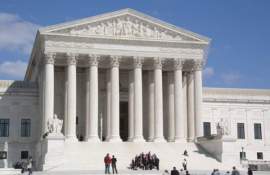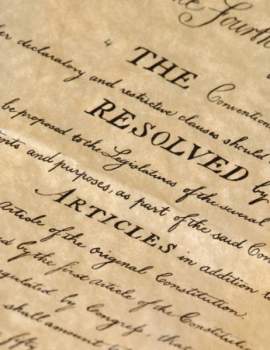
Full Faith and Credit Clause

Popular In Constitution
Purpose Of Lifetime Appointment And Pros And Cons Enumerated Powers Bicameral Legislature Background Article 3 Of The Constitution We The People 1st Amendment Who Wrote The Constitution Judicial Review Equal Protection Clause 5th Amendment 10th Amendment Three Fifths Compromise
The "Full Faith and Credit Clause" stems from Article 4 of the United States Constitution. The ideal of full faith and credit arises from that of the "Articles of Confederation," which actually was the Constitution's predecessor. Within this doctrine, it was stated that full faith and credit be afforded to all states in connection to the legal proceedings of all other states of interest. Courts specified that this section did not actually give states full reign to overrule judgments in others, but rather entailed that states exchange records as additional bases to court proceedings that may involve them.
In 1787, James Madison desired for additional statements to be included within this significant area of concern. The additional terminology set forth that, in addition to a State possessing such full faith and credit, it would also be at the discretion of the Legislature in accordance with the laws set forth, to decide the ways in which such records or acts may be instituted and employed in one State as stemming from another.
Following subsequent alterations to the Full Faith and Credit Clause, we are finally presented with what we know it as today as residing within the United States Constitution. In the final composition of the Full Faith and Credit Clause, it set forth that such full faith and credit be bestowed within each individual State to the "public acts, records, and judicial proceedings" of all alternative states. In addition, it was specified that Congress possessed authority, afforded to it by Federal law, to determine the ways in which the aforementioned items and proceedings of concern be instituted as proof as well as in relation to its final effect upon legal proceedings.
In Mills v. Duryee the Court stated that the Full Faith and Credit Clause be extended to include a guarantee of the institution and existence of records within foreign courts. This is due to the fact that they must maintain and possess a streamline of the maintenance of faith and credit in all courts.
One area of interest that deals with such issues of full faith and credit is that of "same-sex marriage," or rather, "civil unions" in regions that have resisted such legislative changes. As many states have defined marriage as consisting only of members of the opposite sex, they have also concurrently disallowed their State governments from recognizing same-sex marriages instituted in other states or from outside of the country. This presents an area of contention as many states have made same-sex marriage legal by way of either their own State Legislature or Supreme Court ruling.
NEXT: "New States and Federal Property" Explained





















